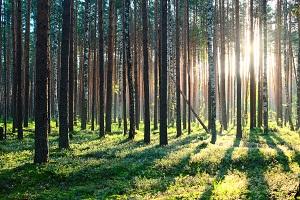Snowy trees, long winters, freezing temperatures – this is the common perception one has of the boreal forest. Yet the boreal forest, which circles the northern hemisphere and forms a ring around the north pole, is the world’s largest and perhaps most overlooked land biome. It covers 27 per cent of the global forest area and more than 60 per cent of the forest area in the UNECE region.
Unlike their counterparts in the tropics, boreal forests have received little attention for their important contribution to stabilizing the global climate, storing large amounts of terrestrial carbon and providing livelihoods to many rural and indigenous people. These issues touch a number of Sustainable Development Goals (SDGs), including Clean Water and Sanitation (SDG 6), Decent Work (SDG 8), Sustainable Production and Consumption (SDG 12), Climate Action (SDG 13) and Life on Land (SDG 15).
To highlight the often-overlooked but crucial contribution of boreal forests to those SDGs, the roundtable “Snapshot on Boreal Forests’ Contribution to the Sustainable Development Goals”, which took place as part of the Regional Forum on Sustainable Development in the UNECE region on 15 March 2021, featured a number of boreal forest experts discussing some of the key questions related to the sustainable management of boreal forest.
What are some of the main challenges to their sustainable management? How can we better understand and communicate the value of the boreal forest for global sustainability? How could the resilience of the boreal forest biome to climate change be increased and vulnerability reduced? How do you manage boreal forests to preserve their economic and environmental services? These were some of the questions addressed by experts.
Dr. Darren Sleep, Senior Director of Conservation Science and Strategies at the Sustainable Forestry Initiative and Leader of the UNECE/FAO Team of Specialists on Boreal Forests underlined the importance of partnerships and cooperation for capitalizing on the contribution of the boreal forest to the SDGs.
Such cooperation, Mr. Sleep highlighted, needs to focus on raising awareness of the myriad of challenges posed by changing climate, improving understanding of sustainable forest management tools globally, as well as countering misleading messages that can affect coordinated policy action on boreal forests.
Mr. Vladimir Dmitriev, Head of Department for Science and International Cooperation at the Federal Forestry Agency of Russia and Deputy Leader of the UNECE/FAO Team of Specialists pointed out that sustainable management of boreal forests means sound consideration of their environmental, economic and social services. He shared some Russian policy measures in protecting forests and using multi-functional approach to their management.
Throughout the discussion, panelists underlined that the threats facing boreal forests are of global scope and can only be solved through international cooperation. No matter the country, climate change affects boreal forests’ capacity to withstand other disturbances such as pests and diseases and extensive wild fires. The UNECE/FAO Team of Specialists on Boreal Forests was created in 2019 in order to tackle these global issues collaboratively and gather scientists and policy-makers around the same table.
To watch the event online visit (in English): https://www.youtube.com/watch?v=hUEM-Iqnyh4 (in Russian): https://www.youtube.com/watch?v=NoHDO5I3Q1Q
For more information on the UNECE/FAO Team of Specialists on Boreal Forests visit: https://unece.org/team-specialists-boreal-forests


